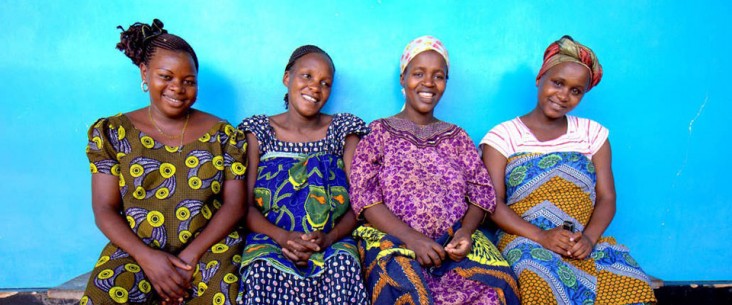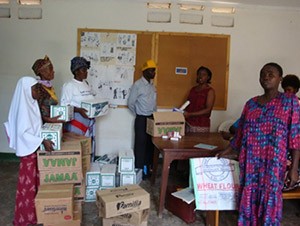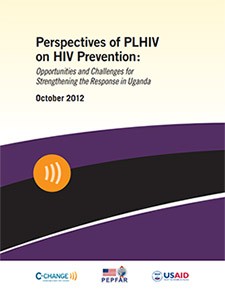- What We Do
- Agriculture and Food Security
- Democracy, Human Rights and Governance
- Economic Growth and Trade
- Education
- Environment and Global Climate Change
- Gender Equality and Women's Empowerment
- Global Health
- Humanitarian Assistance
- Transformation at USAID
- Water and Sanitation
- Working in Crises and Conflict
- U.S. Global Development Lab
Speeches Shim

At a Glance
Principles of Positive Health, Dignity and Prevention
The principles of positive health, dignity and prevention (PHDP), previously known as Prevention with Positives or Positive Prevention, promote shared responsibility for prevention of HIV transmission, meaningful involvement of people living with HIV (PLHIV) and AIDS in response to the epidemic and facilitation of resiliency in PLHIV to live a fulfilled and healthy life despite being HIV-positive. The U.S. Agency for International Development (USAID) continually strives to integrate this concept into existing and new HIV and AIDS programs, and the Agency provides support to organizations such as the Deloitte/FHI TUNAJALI program of Tanzania, whose services engage both community programs and health facilities, to integrate positive health, dignity and prevention interventions into ongoing HIV and AIDS care and treatment services.
USAID’s Response

Preventing the transmission of the virus is underscored by the relentless efforts of USAID-supported projects such as prevention of mother-to-child transmission of HIV programs, condom social marketing and the strategic investment in persons, particularly PLHIV trained to serve as expert clients and patients at the community and facility levels. These expert clients and patients provide ongoing support for their peers in a bid to ensure sustained retention in care, adherence to treatment and the shared responsibility to prevent further transmissions.
People living with HIV and AIDS are a strong and vital voice in the global community. They influence programs and policies on the local, national and regional levels and can lead the way to positive change and innovation for specific country responses. USAID programs have always partnered with PLHIV networks, providing support for these entities and their affiliated PLHIV support groups.
To further facilitate the reality of the global call for meaningful involvement of PLHIV in the response to the pandemic, USAID has collaborated with critical stakeholders, such as UNAIDS, the Global Network of People Living with HIV (GNP+) and its affiliated associations since 2009, providing support and facilitating platforms where these sectors of civil society can effectively and meaningfully engage in the global discourse and response to the pandemic. The following links include some of these fora and similar resources:
- International Technical Consultation on Positive Health, Dignity and Prevention, Tunisia – April 2009 [PDF, 521KB]
- International AIDS Conference, Pre-meetings Example – July 2012
- Positive Health, Dignity and Prevention: A Policy Framework – January 2011 [PDF, 2.2MB]
- Positive Health, Dignity and Prevention Operational Guidelines – June 2013 [PDF, 3.2MB]
Current Programmatic Highlights
USAID’s strategic approach to institutionalizing the principles of PHDP is reflected in the robust operational research by implementing partners – of note most recently is the community-based PHDP multicountry baseline assessment by the C-Change project, implemented by FHI 360 (formerly African Education and Development). This assessment is unique in its emphasis on primarily reflecting the perspective of PLHIV regarding HIV service delivery, programs design, implementation and monitoring. A synoptic report of three countries – Uganda, Mozambique and Ethiopia – titled Perspectives of People Living with HIV: Opportunities and Challenges for Strengthening the Response in Southern and Eastern Africaas well as individual country reports, which are listed below, are available. These reports bring to light a myriad of gaps in program design, implementation, monitoring and evaluation and service delivery. The Perspectives also describes recommendations by PLHIV. By 2015, the goal for USAID HIV programs is to continue partnering with the networks of PLHIV and relevant civil society stakeholders to ensure that our service delivery and program implementation truly respond to the needs of PLHIV in line with the U.S. President’s Emergency Plan for AIDS Relief (PEPFAR) Blueprint [PDF, 2.8MB].
Additional Resources

- Perspectives of People Living with HIV: Opportunities and Challenges for Strengthening the Response in Southern and Eastern Africa [PDF, 1.5MB]
- Perspectives of People Living with HIV on HIV Prevention: Opportunities and Challenges for Strengthening the Response in Uganda [PDF, 1.2MB]
- Perspectives of People Living with HIV on HIV Prevention: Opportunities and Challenges for Strengthening the Response in Ethiopia [PDF, 2.0MB]
- Perspectives of People Living with HIV on HIV Prevention: Opportunities and Challenges for Strengthening the Response in Mozambique [PDF, 1.4MB]
Learn more about the Deloitte/FHI TUNAJALI program of Tanzania >

Comment
Make a general inquiry or suggest an improvement.